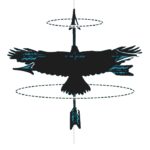-
-
- Buy a teacup in Paris when you’re nineteen. Find one made of fine bone china, delicate and fragile and blue. Carry it home in bubble wrap. Nestle it at the center of your duffle bag like a ceramic, unbeating heart.
-
- After many years, put the teacup on an antique dresser that’s already been stained by a fish tank. Do this daily. Stop only when you notice the appearance of damage.
-
- To say with certainty where a water ring comes from, you must always create a second one. You must put the cup on another dry surface and wait. This will tell you as much as looking inside the cup would tell you, as seeing a silvery crack along its wall.
-
- You are allowed to mourn the teacup, that you carried across an ocean with you. Be sad that it is broken, because a broken teacup is no longer useful. Be sad that you have broken it, because your lips have always been gentle, and you have always taken such small gulps of the world. Wonder, daily, how you drank from a cup that was broken and never noticed the moment it broke.
-
- Is a command in past or present tense? You’re in Paris and you’re nineteen, you buy a teacup on a Sunday at the only open shop and you pour your bitterness into it. You carry that cup across the lines on a map, you watch the borders of the nations beneath you curve and splinter like a crack in fine bone china. If you put your wounds in a teacup, the walls must remain intact, because the fish tank broke in the seventies but the dresser’s still dark with water. You must consider what will happen when the teacup breaks. You must glue it together, or throw it away.
 Artwork by: Christian Fregnan
Artwork by: Christian Fregnan

-